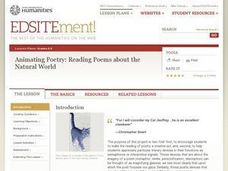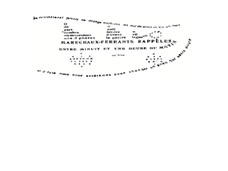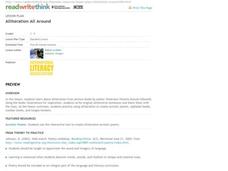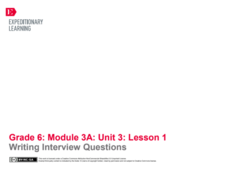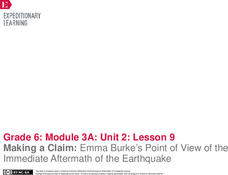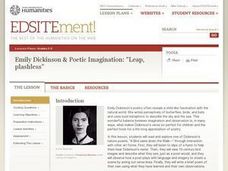Curated OER
Whale Song Acrostic
What do whales sing about? Invite your class to imagine the thoughts of whales before writing acrostic poems on the topic. The plan blends together a bit of life science with plenty of opportunities for creativity and writing.
BW Walch
“Outsider” Poet Kay Ryan Goes from Poetry Club Reject to Poet Laureate
The cat might have got your tongue, but you can’t avoid the elephant in the room while you wait for the other shoe to drop. After all, the early bird gets the worm and the chickens are circling. After researching Poet Laureate Kay Ryan...
Curated OER
"Take my Advice": Poems with a Voice
Discuss the meaning of the phrase tone of voice with the class. They respond to a variety of scenarios where a particular tone would be prevalent. They then read "Mother to Son" without knowing the title and answer some questions about...
Crafting Freedom
George Moses Horton: Crafting Virtual Freedom Through Poetry
What is "virtual freedom"? How about "enslaved entrepreneurship"? Class members will learn about these terms and much more as they read the poems and examine the life of George Moses Horton.
Curated OER
Bringing Household Items to Life
Use folk tales as inspiration for learning about and using personification in creative writing. Learners brainstorm together in order to practice personification before writing their own poems or paragraphs about a household object.
National Endowment for the Humanities
Animating Poetry: Reading Poems about the Natural World
Students complete poetry analysis activities. In this poetry analysis instructional activity, students consider the use of imagery and sound devices in poetry. Students translate poetry into another art, read a diverse selection of...
EngageNY
Writing the Final Narrative: Monologue or Concrete Poem
Get inspired to help those creative juices flow. Using the resource, scholars write their final, best version of their narrative monologues or concrete poems. Next, they prepare for a performance task by watching and discussing a video...
Curated OER
Lesson: Weaving Words
A woven rug depicting birds and cornstalks becomes the inspiration for a lesson on critical thinking and creative writing. Learners analyze the symbolism found in the rug and then compose a descriptive paragraph or poem that embodies the...
Curated OER
Picture Perfect Poetry
Do your language arts students love to draw? Use this instructional activity to reinforce poetic techniques with illustration. After drawing what they think poem would look like with no words, middle and high schoolers work on several...
ReadWriteThink
Alliteration All Around
Discover alliteration found in picture books by Pamela Duncan Edwards. Then, dive into a read aloud of Alligators All Around by Maurice Sendak. This practice sets the stage for budding poets to create their own acrostic poem, write an...
Curated OER
Lesson: Jazzy Stripes and Worlds
Every artist creates in his own unique way drawing from a variety of inspirational sources. Upper graders work to expand their understanding of the creative process by first analyzing a modern piece and then creating one. They listen to...
Curated OER
Life Reflections in Songwriting and Poetry
Learners analyze, discuss and compare sources of inspiration, use of words and imagery, and other differences in writing styles between two featured songwriters. This is an introductory lesson to a creative project unit.
Curated OER
The Lion, the Witch, and the Wardrobe: Bio Poem
Get to know your learners on a deeper level or invite them to step into someone else's shoes by introducing them to a bio poem. With this type of poetry, scholars will answer questions such as self-description, hopes for the future, and...
Denver Art Museum
Putting Images into Words
Engage your class in art analysis of Indian Look-Alike by Melanie Yazzie. Using this work of art as inspiration, writers compose a poem or short story. After a peer review session, the teacher conveys information about the work of art as...
Denver Art Museum
The Poetry in Non-Events
The photograph, Nellie and her Italian Soda is viewed and discussed by the class. They are instructed to use the photograph as inspiration to write a poem about non-events, or things that are beautiful in every day life. Pupils use a...
Curated OER
Create a Video Poem
Collaborate to create a visual version of a poem using video. Before class, choose a poem to pick apart. Read it aloud and then analyze it in detail as a class. Assign a line or short section to each student to expand upon using a...
Novelinks
The Hobbit: Biopoem
As part of their reading of The Hobbit, readers create a biopoem for one of Tolkien's characters.
EngageNY
Writing Interview Questions
And now for the star witness! Scholars take a look at a model newspaper article and discuss the importance of eyewitness accounts. In groups of three, they take turns underlining text from eyewitnesses. They then regroup to talk about...
Roald Dahl
The Twits - Mrs Twit
"A person who has good thoughts cannot ever be ugly." The second lesson in an 11-part unit that accompanies The Twits by Roald Dahl uses poetry to encourage positive character traits. Mrs. Twit has ugly thoughts, but those thoughts can...
Curated OER
Poetry in Motion
Students create individual poems containing varied line lengths, punctuation, and rhythm, and explain how each contributes to overall effect of the poem.
EngageNY
Making a Claim: Emma Burke’s Point of View of the Immediate Aftermath of the Earthquake
Sharpen those pencils; it's time to write! Scholars begin writing the first body paragraph of their literary analysis essays. Additionally, pupils use graphic organizers to analyze a character's point of view from Laurence Yep's...
Curated OER
Image to Word
Students research art and write about how a certain art piece relates to their own life. In this art lesson plan, students go to Brooks museum and discuss the art they find there.
Curated OER
I Am a Book
Third graders discuss books that have been banned and the things that they have in common. They explore the concept of freedom of speech and write poems based on their discussion.
Curated OER
Emily Dickinson & Poetic Imagination: "Leap, plashless"
Students analyze the poems of Emily Dickinson and write their own nature poem. In this poetry analysis lesson, students read Dickinson poetry and analyze the use of imagery, sound, and metaphor. Students write their own nature poem using...







